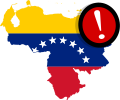
During the crisis in Venezuela, the United States applied sanctions against specific Venezuelan government entities and individuals associated with the administration of Nicolás Maduro, along with sanctions applied by the European Union (E.U.), Canada, Mexico, Panama and Switzerland. By September 2019, the Center for Strategic and International Studies said 119 Venezuelans had been sanctioned by the U.S. and several other countries.[1]
Early sanctions came in response to repression during the 2014 and the 2017 Venezuelan protests, and activities both during the 2017 Constituent Assembly election and the 2018 presidential election. Sanctions were placed on current and former government officials, including members of the Supreme Tribunal of Justice (TSJ) and the 2017 Constituent National Assembly (ANC), members of the military and security forces, and private individuals accused of being involved in human rights abuses, degradation in the rule of law, repression of democracy, and corruption. Canada and the E.U. began applying sanctions in 2017.
In August 2017, the administration of Donald Trump imposed sanctions which prohibited Venezuela's access to U.S. financial markets, and in May 2018, expanded them to block purchase of Venezuelan debt.[2] Beginning in January 2019, during the Venezuelan presidential crisis, the U.S. applied additional economic sanctions to individuals or companies in the petroleum, gold, mining, and banking industries and a food subsidy program; other countries also applied sanctions in response to the presidential crisis.
Companies in the petroleum sector evaded the sanctions on Venezuela's state-owned oil company, PDVSA, to continue oil shipments. In October 2023, the administration of Joe Biden temporarily lifted some U.S. sanctions on the oil, gas and gold industries in exchange for the promise of the release of political prisoners and free 2024 elections.[3][4] Most of the sanctions were reimposed in April when the U.S. State Department said the Barbados Agreement to hold free elections had not been fully honored,[5] although waivers were allowed to some companies in the form of individual licenses to continue operating in the oil sector.[6]
| Crisis in Venezuela |
|---|
 |
|
|
- ^ Cite error: The named reference
CSISwas invoked but never defined (see the help page). - ^ Cite error: The named reference
Congressional Research Service-2024was invoked but never defined (see the help page). - ^ Cite error: The named reference
NewLimitswas invoked but never defined (see the help page). - ^ Cite error: The named reference
CongressionalResearchService2021was invoked but never defined (see the help page). - ^ Cite error: The named reference
Reimposewas invoked but never defined (see the help page). - ^ "Up to 50 firms seek US oil licenses in Venezuela, official says". Reuters. 23 May 2024. Retrieved 22 August 2024.